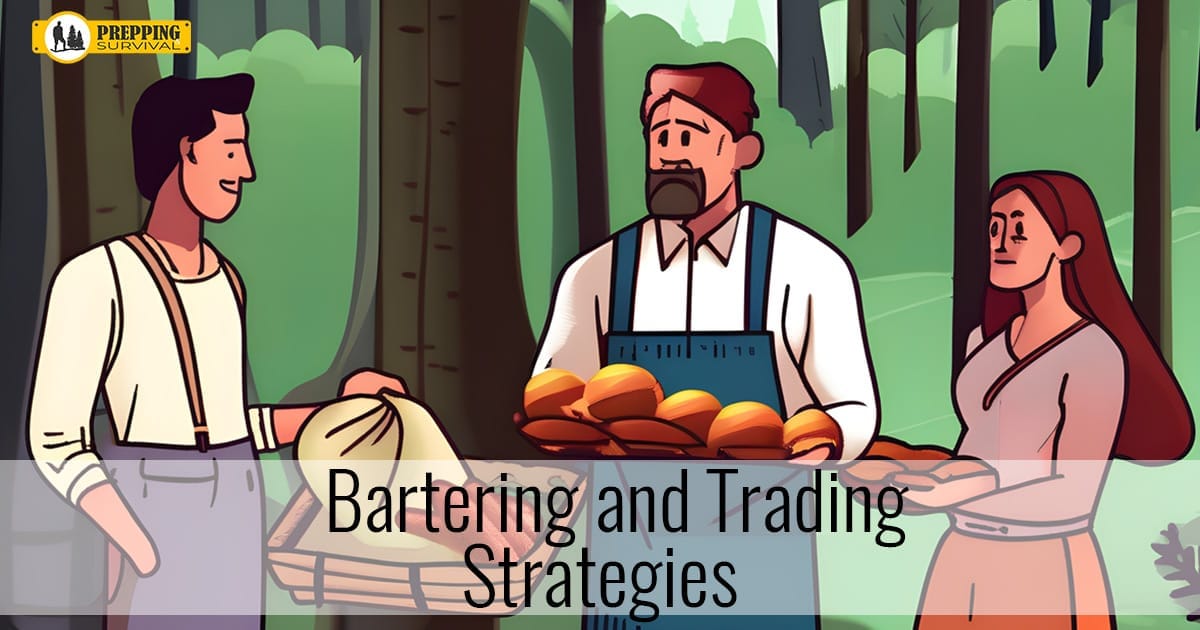Bartering and trading
Bartering and trading can become pivotal in situations where traditional currency systems are disrupted or other scenarios where resources are scarce. Learning and developing effective strategies for bartering and trading ensures that you can obtain necessary supplies or services without relying solely on cash transactions.
Here are a few key strategies to consider for successful bartering and trading, especially in a prepper context.
Understand the Value of Goods and Services
- Research and Knowledge: Understand the intrinsic value of various items and services you have and those you need. Some goods, like food, water purification systems, and medical supplies, may hold more value in emergency situations than any luxury items.
- Supply and Demand: The value of items can fluctuate based on supply and demand dynamics. Items in high demand but low supply will naturally hold more bargaining power, bit will be more expensive for you too if you need them.
Inventory Management
- Diverse Supplies: Maintain a diverse inventory of goods that are likely to be in high demand during various scenarios. This includes non-perishable foods, medical supplies, tools, and seeds for growing food. It depends on your area and the nature of possible emergency situations, of course.
- Skill Sets: Develop and hone specific skills that will be valuable in a barter economy, such as medical knowledge, mechanical repair, or food preservation. Services can often be traded well when goods are not available.
Establish Trust and Build Relationships
- Community Networks: Build strong relationships within your community before you need to barter. Trust and reputation can significantly influence your success in trading and improve your chances of getting what you need in the first place.
- Fairness and Honesty: Always engage in fair trades and be honest about the condition and value of your goods. Establishing yourself as a reliable and fair trader will open more opportunities for future exchanges, as opposed to being labeled as a lier.
Communication and Negotiation Skills
- Clear Communication: Be clear and precise about what you have and about what you need. Misunderstandings can lead to mistrust or unfavorable deals, and even to becoming labeled as untrustworthy person.
- Negotiation: Develop your negotiation skills. Effective bartering can help you achieve more favorable terms without causing friction between parties. It is a very important skill for bartering and tradind and will vastly improve your chances of getting the needed resources, even if you have limited resources available for bartering and trading.
Safety and Security
- Discretion: Be cautious about revealing the extent of your supplies to others. Knowledge of your resources can make you a target for theft or coercion and is one thing you don’t want in uncertain conditions.
- Secure Trading Locations: Conduct trades in safe, neutral locations whenever possible. If trading with strangers, consider bringing a trusted companion for security and better feeling.
Documentation and Records
- Keep Records: While it might seem too formal, keeping records of trades can be very much beneficial, especially for larger or more complex transactions. This can help resolve disputes that might occur later and keep track of your inventory at the same time.
Adaptability and Flexibility
- Be Flexible: Be willing to adapt your trading strategies based on daily changing circumstances and needs. Flexibility can help you make the most of the available trading opportunities.
Practice and Preparation
- Mock Trading: Practice bartering with your friends or family members to refine your negotiation skills and get a feel for different trading dynamics. You will also get a benefit of your family members getting involved.
Conclusion
Incorporating these bartering and trading strategies into your preparedness plans can vastly enhance your resilience in times of crisis. By understanding the value of goods and services, managing your inventory wisely, building strong community relationships, and negotiating effectively, you can navigate the complexities of bartering and trading with confidence.
This approach not only ensures that you can secure essential resources when needed but also fosters a sense of community and mutual support that can be invaluable in challenging times.
Related:






